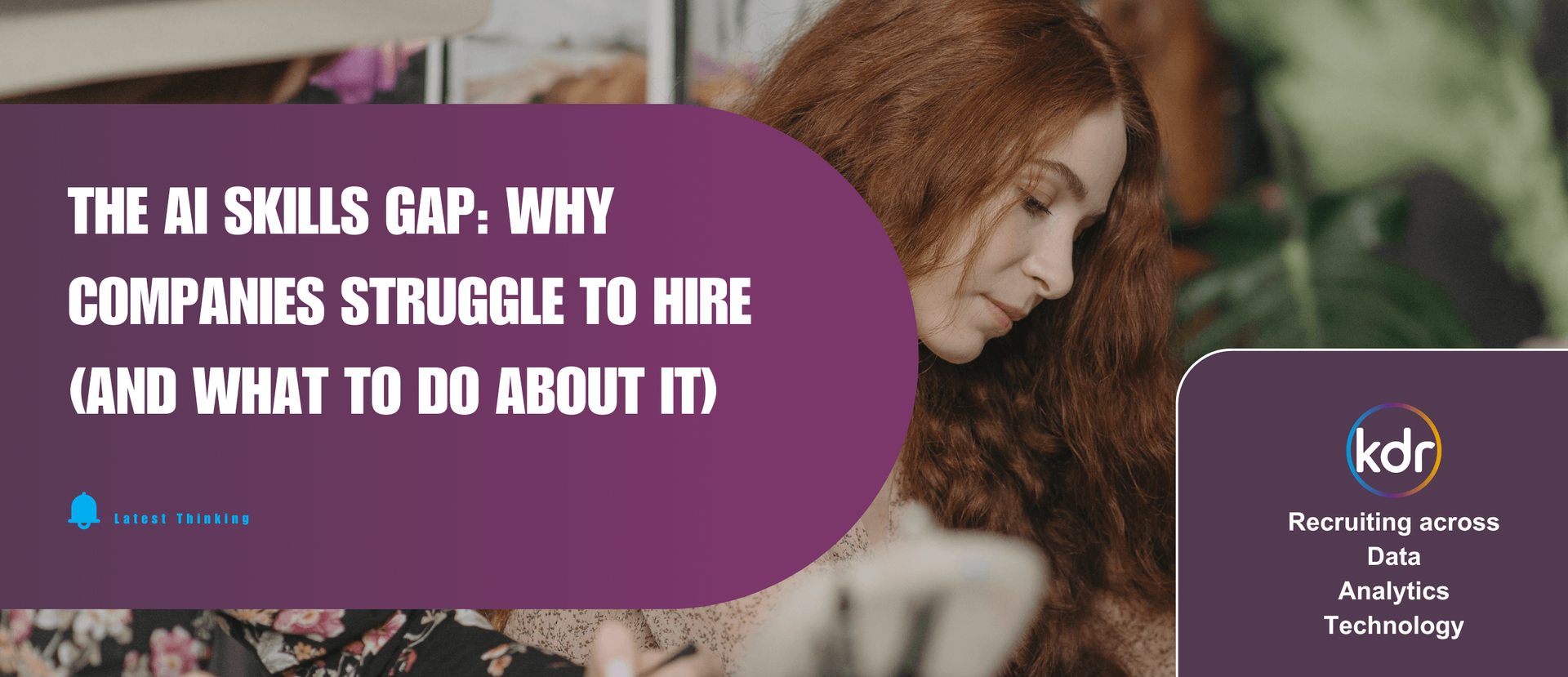What the AI Opportunities Action Plan Means for Data and Tech Professionals
The UK government has released its ambitious AI Opportunities Action Plan

The UK government has released its ambitious AI Opportunities Action Plan, which outlines a comprehensive strategy to position Britain as a global leader in artificial intelligence. With a clear focus on leveraging AI for economic growth, public service transformation and national security, this plan lays the groundwork for an exciting new era in the data and technology sectors. For businesses seeking to innovate and candidates looking to advance their careers, this roadmap presents transformative opportunities.
As it’s rather a long document, we have read the plan and summarised it below. If they follow through on the plans then it should provide a fantastic foundation for clients and job seekers alike who are working in this space.
Key Highlights of the AI Opportunities Action Plan
Step 1 is to lay the foundations for success
The government plans to build a secure and sustainable AI infrastructure. Key to this is expanding the AI Research Resource (AIRR) by 2030. This resource is a national hub for AI-focused computational power, data access and collaboration. For example the AIRR will offer large-scale computing capabilities required to train advanced AI models, which typically demand immense processing power.
Segmented into sector specific clusters of national priority (e.g. healthcare or climate) the resource aims to integrate public and private data assets, enabling researchers and organisations to utilise rich datasets for AI innovation. It’s designed to help scale AI solutions from research to real-world application by creating partnerships between academia, startups as well as enterprises. One of the areas of concern is sustainability so it also aims to help ensure AI development is aligned with long-term ecological goals in mind.
In essence, the AIRR is the backbone of the UK’s strategy to lead in global AI innovation, providing the resources required for breakthroughs in areas like large language models, robotics and AI for science.
Adding to this foundation will be the launch of a National Data Library (NDL) to responsibly unlock public and private data assets. For businesses, access to curated datasets will enable more accurate model training, predictive analytics and innovation in AI-driven solutions.
Opportunities
Companies contributing to the Library could benefit from public recognition and partnerships and data becoming central to AI development. Candidates skilled in data governance, engineering and AI-driven analysis should find increased opportunities to work with these assets.
As part of the plans, the report points to the significant skills gaps and how the UK is falling behind other countries so the recommendation is to train tens of thousands of AI professionals and establish scholarships to attract top talent. There is also an opportunity here to access apprenticeship funding for existing members of staff to upskill themselves in AI related topics.
Part of laying the foundations relies on robust regulation and earned trust. The UK’s regulatory framework aims to be flexible and proportionate, ensuring that it supports innovation while mitigating risks. Regulators in key sectors (for example: healthcare, finance or transport) are encouraged to provide clear, tailored rules for AI applications in their industries. This allows for tailored approaches with perhaps more credible outcomes. Through institutions like the AI Safety Institute, they want to tread a fine line between taking a pro-innovation approach but also providing a robust framework of regulation within which to operate. Although UK-based, the AI Safety Institute is designed to work with like-minded countries and organisations to shape global norms and standards for AI governance. By maintaining partnerships with key allies, the institute ensures that the UK's approach to AI safety aligns with and contributes to international frameworks.
The Next Step would be to transform lives through AI adoption
Via a “scan, pilot and scale” approach they want businesses of all sizes to be able to take advantage of the opportunities. This should be an exciting period for business and employees alike as they get involved in many more mini pilot projects rather than getting bogged down with unwieldy large-scale projects without proof of concept.
The report also cites UK based AI Growth Zones which are areas identified that could help with the smooth acceleration of AI innovation, for example simplifying planning permission for data centres (access to land, energy and resources)
What does this mean for data and tech businesses?
It should provide a springboard for innovation. The government’s investment in AI infrastructure, such as the AIRR and AI Growth Zones, will create an environment ripe for innovation. Clients in the data and technology sectors can expect access to cutting-edge tools, robust computational resources, and enhanced collaboration opportunities through public-private partnerships.
The opportunity lies in access to the National Data Library. Businesses can leverage the National Data Library to access high-value datasets, accelerating AI model development and deployment.
Companies should explore government-backed initiatives, such as innovation sandboxes, to test and scale new technologies while reducing regulatory risks.
Pro-innovation regulation will help. Balanced regulations and assurance frameworks provide clarity and confidence for businesses to integrate AI into their operations.
Clients should engage with sector-specific AI regulatory guidance and invest in upskilling teams to meet emerging compliance standards.
With initiatives to train tens of thousands of AI professionals and attract global talent, businesses will benefit from an increasingly skilled workforce.
Clients can tap into a diverse pool of AI talent equipped to develop innovative solutions.
Collaborate with universities and AI training programmes to secure emerging talent and offer compelling career development opportunities.
An Expanding Job Market
The plan’s focus on AI adoption and innovation will create demand for specialists in areas such as data engineering, machine learning, computer vision, and AI governance.
AI Growth Zones and national AI initiatives will generate job openings in both emerging startups and established organisations.
Candidates should upskill in high-demand areas, such as natural language processing, cloud-based data engineering, and AI ethics.
So what are the pathways to progression?
Apprenticeships, AI-focused higher education programmes, and lifelong learning opportunities will make it easier for professionals to enter or advance in the AI field. Conversion courses and industry-relevant certifications will open doors for individuals from non-AI backgrounds to transition into AI roles. If you are interested in following this path, take advantage of government-funded programmes to gain relevant qualifications and position yourself as a valuable asset in the AI-driven job market. You can find out where the apprenticeships are run here: https://findapprenticeshiptraining.apprenticeships.education.gov.uk/courses/561 (apprenticeship course and funding are also available for existing and senior members of the team).
Looking Ahead
The AI Opportunities Action Plan presents a bold vision for integrating artificial intelligence into every aspect of the UK’s economy and society. For clients in the data and tech sectors, this is a call to embrace innovation and position themselves as leaders in their fields. For candidates, it’s an invitation to develop new skills and seize emerging opportunities in a job market where for the first time in a very long time, we just don’t know how this technology will evolve.
Now is the time to act. Whether you’re looking to hire top talent, adopt transformative technologies, or make your next career move, the opportunities in AI are boundless.






